|
Books Should Be Free Loyal Books Free Public Domain Audiobooks & eBook Downloads |
|
|
Books Should Be Free Loyal Books Free Public Domain Audiobooks & eBook Downloads |
|
Non-fiction |
|---|
|
Book type:
Sort by:
View by:
|
By: Fleming Mant Sandwith (1853-1918) | |
|---|---|
 Sleeping Sickness
Sleeping Sickness
In the twenty-first century sleeping sickness is still a life-threatening disease of adults and children and a hazard to tourists in East African game parks.The protozoan parasite is transmitted by the tsetse fly, a buzzing insect with reddish eyes and a large biting proboscis. In 1912, when this short monograph was written, physicians of the British Empire understood that trans-continental expeditions manned by infected African porters, had set off an epidemic of sleeping sickness that had claimed half a million lives... | |
By: Florence A. Merriam (1863-1948) | |
|---|---|
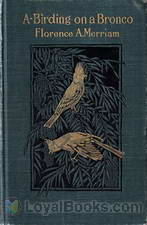 A-Birding on a Bronco
A-Birding on a Bronco
Florence Augusta Merriam Bailey (August 8, 1863 - September 22, 1948) was an American ornithologist and nature writer. She started observing bird behavior at a time when most bird study was based on collections and skins. By 1885, she began to write articles focusing on protecting birds. Her introduction of a birdwatching field guide, aimed at living birds, is considered the first in the tradition of modern bird guides. She wrote the first of these at the age of 26, initially as a series of notes in the Audubon Magazine and later as books. In "A-Birding on a Bronco," she writes an engaging memoir about her several trips to study birds on a ranch in California in the late 1800's. | |
By: Florence Hartley | |
|---|---|
 Ladies' Book of Etiquette, and Manual of Politeness
Ladies' Book of Etiquette, and Manual of Politeness
A guide for ladies, written in 1860, on what is accepted as correct behavior in polite society. The advice covers dress, travelling, staying in hotels, attending and giving parties and balls, making and receiving morning calls, letter writing, how to deal with servants, what accomplishments every well bred lady should be expected to acquire and how to choose a suitable husband. | |
By: Florence Morse Kingsley (1859-1937) | |
|---|---|
 Neighbors
Neighbors
The final story featuring the inhabitants of the growing township of Innisfield: Mrs Philura Pettibone’s story reaches its long-awaited conclusion and Miss Malvina’s life is changed forever by the arrival of various ”fur’ners”. Published in 1917, with America’s entry into the war in Europe imminent, the story dwells on friendships, the melting- pot of nationalities that make up the USA, and the personal struggle between pacifism and patriotism in wartime. While the writing keeps its gently ironic style for most of the time, it also features more serious and sometimes rather melodramatic themes... | |
By: Florence Nightingale (1820-1910) | |
|---|---|
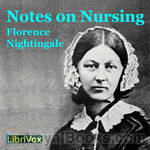 Notes on Nursing
Notes on Nursing
Notes on Nursing was published in 1859 and is a fascinating view into the theories underpinning the early development of modern nursing and public health reform by "the Lady with the Lamp", Florence Nightingale. Emphasising common sense and thought for the patient's care in many more ways than just administering physician-prescribed medicines, this is still a very relevant book for those interested in health or caring for the sick and infirm today.Summary by Cori Samuel. | |
By: Florence Scovel Shinn (1871-1940) | |
|---|---|
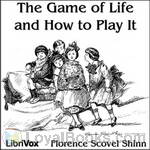 The Game of Life and How to Play It
The Game of Life and How to Play It
Florence Scovel Shinn, an illustrator living in New York City, became a teacher of New Thought after a divorce. New Thought was a movement which holds the belief that individuals can create their own reality through intentional thoughts and prayer, much like the current Law of Attraction movement. The Game of Life and How to Play It is her first book, and is remarkable for being written by a woman and meant for a genteel female audience. | |
By: Founding Fathers of the United States | |
|---|---|
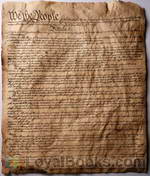 The Constitution of the United States of America, 1787
The Constitution of the United States of America, 1787
The Declaration of Independence was signed on July 4, 1776. It announced that the thirteen American colonies, who were at war with Great Britain in the American Revolutionary War, no longer considered themselves part of the British Empire. They now called themselves a new nation, The United States of America. This famous document went on to become a well-known keystone of the human rights movement. However, the newly formed state had no real identity or philosophy and were merely a loose collection of states that had freed themselves from colonial rule... | |
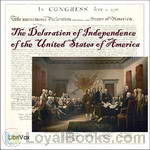 The Declaration of Independence of the United States of America
The Declaration of Independence of the United States of America
Declaration of Independence is the document in which the Thirteen Colonies declared themselves independent of the Kingdom of Great Britain and explained their justifications for doing so. It was ratified by the Continental Congress on July 4, 1776. | |
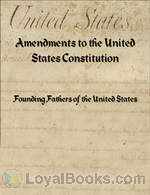 Bill of Rights & Amendments to the US Constitution
Bill of Rights & Amendments to the US Constitution
The Constitution has a total of 27 amendments. The first ten, collectively known as the Bill of Rights, were ratified simultaneously. The following seventeen were ratified separately. | |
By: Frances Alice Forbes (1869-1936) | |
|---|---|
 Saint Athanasius: The Father of Orthodoxy
Saint Athanasius: The Father of Orthodoxy
A short and rather old fashioned biography a great saint. Don't expect subtlety; it's unapologetic hagiography. The saint is presented as a figure of pristine brilliance, courage and integrity and his persecutors as conniving villains. But to those who appreciate what was at stake in the controversy, Athanasius is indeed a God-sent hero. This is an informative, if quaint, introduction to a fascinating figure in history. | |
By: Frances Anne Kemble (1809-1893) | |
|---|---|
 Journal of A Residence On A Georgian Plantation, 1838-1839
Journal of A Residence On A Georgian Plantation, 1838-1839
Fanny Kemble was a British actress who married mega-plantation owner, Pierce Butler of Georgia. During her marriage she kept journals of everyday life, and after some years grew to detest the institution of slavery and the things Butler stood for. Kemble eventually divorced him, but it wasn't until after the Civil War had started that she published her journal about her observations and the experiences of the hundreds of African American slaves owned by her ex-husband. | |
By: Frances Calderón de la Barca (1804-1882) | |
|---|---|
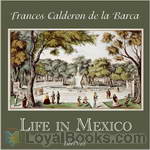 Life in Mexico
Life in Mexico
FRANCES CALDERON DE LA BARCA, born in Edinburgh, 1804, the daughter of William Inglis. After her father’s death she settled in America, where she married the Spanish diplomat, Don Angel Calderon de la Barca. She accompanied him on his various appointments to Mexico, Washington, and finally to Madrid, where she was created Marquesa de Calderon de la Barca by Alfonso XII and died in 1882. The present work is the result of observations made during a two years’ residence in Mexico, by a lady, whose position there made her intimately acquainted with its society, and opened to her the best sources of information in regard to whatever could interest an enlightened foreigner... | |
By: Frances E. W. Harper (1825-1911) | |
|---|---|
 Sowing and Reaping
Sowing and Reaping
This novel is subtitled A Temperance Story, which identifies explicitly the focus of the work. Frances Harper is a Christian moralist and uses her writings for didactic purposes. Here she contrast two couples, one, Belle and Paul, who do not drink and whose lives are happier and more productive, and the other, Jeanette and Charles, who lives are destroyed by the demon rum. | |
By: Frances M. A. Roe | |
|---|---|
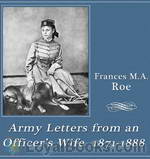 Army Letters from an Officer's Wife, 1871-1888
Army Letters from an Officer's Wife, 1871-1888
"There appeared from the bushes in front of me, and right in the path, two immense gray wolves . . . Rollo saw them and stopped instantly, giving deep sighs, preparing to snort, I knew . . . To give myself courage, I talked to the horse, slowly turning him around . . . when out of the bushes in front of us, there came a third wolf! The situation was not pleasant and without stopping to think, I said ‘Rollo, we must run him down - now do your best’ and taking a firm hold of the bridle, and bracing myself in the saddle, I struck the horse with my whip and gave an awful scream... | |
By: Frances Sheridan | |
|---|---|
 Memoirs of Miss Sidney Bidulph
Memoirs of Miss Sidney Bidulph
Sidney and Cecilia are best childhood friends who are forced to part for 5 years. In that interval, Sidney Bidulph - an undoubtedly good and dutiful woman - writes to her friend about everything: her marriage, her children, her other friendships and, above all, about her great love for Mr. Faulkland. In an amazing and unforgettable way, this book shows us that the road to happiness is not always clear - and that sometimes doing what seems to be right is not really the right thing to do. With Rachel's lovely reading, we see her - Sidney Bidulph - as she was meant to be, and as she really is. | |
By: Francis Archibald Bruton | |
|---|---|
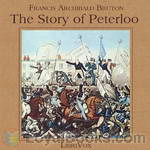 The Story of Peterloo
The Story of Peterloo
On 16th August 1819 around 60,000 people gathered at St. Peter’s Fields, Manchester, to rally for parliamentary reform. Shortly after the meeting began, a troop of Hussars and local yeomanry rode into the crowd, wielding clubs, swords and sabres, leaving 18 dead and more than 700 severely injured. In the following years, the Peterloo Massacre was the subject of several trials and inquiries. It now counts as one of the most significant events in the history of the British labour movement. Francis Archibald Bruton’s account of the day’s events, published for its centenary and based on a detailed examination of contemporary accounts, is both dispassionate and moving... | |
 Lancashire
Lancashire
The county of Lancashire in the north-west of England is best known as the engine room of the nineteenth-century Industrial Revolution. Steering clear of the industrial districts, F. A. Bruton takes the reader on an engaging tour of the county's beauty spots and lesser known landscapes. Taking the view that the charm of a district is nothing without its historical associations, Bruton packs his account with historical detail and literary references to, among others, Leland, Wordsworth, Ruskin, Arnold, and Mrs. Carlyle. (Introduction by Phil Benson) | |
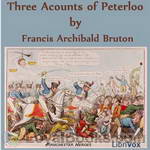 Three Accounts of Peterloo
Three Accounts of Peterloo
A companion volume to F.A. Bruton's 'The Story of Peterloo', the full title of this short collection is 'Three Accounts of Peterloo by Eyewitnesses, Bishop Stanley, Lord Hylton, John Benjamin Smith with Bishop Stanley's Evidence at the Trial'. The three contemporary accounts, each with a short introduction by the editor, give different perspectives on the events of 16 August 1819, when a troop of Hussars accompanied by the local Yeomanry rode into a peaceful reform rally at St. Peter's Fields, Manchester, leaving 18 dead and more than 700 injured. | |
By: Francis Bacon (1561-1626) | |
|---|---|
 The Essays of Francis Bacon
The Essays of Francis Bacon
Among the many ideas explored in this book are beauty, gardens, honor and reputation, cunning, nobility, friendship and many others. Authored by the man who is credited with having invented the essay form in English, The Essays of Francis Bacon was written over an extended period, ranging from the mid sixteenth century. They were compiled in a single edition in 1597 and later re-written, enlarged and added to in other editions in 1612 and 1625. However, their compelling and insightful quality still appears fresh and appealing to modern day readers... | |
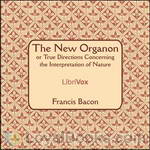 The New Organon Or True Directions Concerning The Interpretation of Nature
The New Organon Or True Directions Concerning The Interpretation of Nature
The Novum Organum is a philosophical work by Francis Bacon published in 1620. The title translates as “new instrument”. This is a reference to Aristotle’s work Organon, which was his treatise on logic and syllogism. In Novum Organum, Bacon details a new system of logic he believes to be superior to the old ways of syllogism. For Bacon, finding the essence of a thing was a simple process of reduction, and the use of inductive reasoning . . . This work was critical in the historical development of the scientific method. | |
 The New Atlantis
The New Atlantis
In 1623, Francis Bacon expressed his aspirations and ideas in New Atlantis. Released in 1627, this was his creation of an ideal land where people were kind, knowledgeable, and civic-minded. Part of this new land was his perfect college, a vision for our modern research universities. Islands he had visited may have served as models for his ideas. | |
By: Francis Bond Head (1793-1875) | |
|---|---|
 Rough Notes Taken During Some Rapid Journeys Across the Pampas and Among the Andes
Rough Notes Taken During Some Rapid Journeys Across the Pampas and Among the Andes
“Galloped on with no stopping, but merely to change horses until five o’clock in the evening—very tired indeed, but . . . saw fresh horses in the corral, and resolved to push on. At half-past seven, after having galloped a hundred and fifty-three miles, and been fourteen hours and a half on horseback got to the post—quite exhausted—I could scarcely speak . . . an hour before daylight was awakened by the Gaucho, got up, had some mate, mounted my horse, and as I galloped along felt pleased that the sun should find me at my work... | |
By: Francis Cassilly (1860-1938) | |
|---|---|
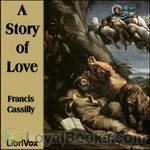 A Story of Love
A Story of Love
This is not a love story, but the story of love, a love which every man and woman was created to experience, a love so intense and fulfilling that it scarcely seems possible to grasp, yet one that is offered to every human person who opens his heart and mind to its beauty and wonder. This is a love that so many of our forefathers have found and even now enjoy, but which so many of us still seek. The American Jesuit Father Cassilly opens our eyes to this love, the unifying and personal love between the human person and his Creator... | |
By: Francis Edward Tourscher (1870-1939) | |
|---|---|
 Work Of The Sisters During The Epidemic Of Influenza October, 1918
Work Of The Sisters During The Epidemic Of Influenza October, 1918
In 1918 over 2,000 Roman Catholic nuns left their convents in the Philadelphia area to nurse the sick and dying of the influenza epidemic. Twenty-three of the sisters died because of their ministrations. This is an account of their heroic work published in the American Catholic Historical Society Of Philadelphia, 1919. “Gathered and arranged from reports of personal experiences of the sisters and contributed by request of the compiler.” The compiler/author was an academic/priest at Villanova University in Pennsylvania. Since there are no chapter headings, this recording uses the section headings of the book. - Summary by David Wales and book's subtitle | |
By: Francis J. Finn, S.J. (1859-1928) | |
|---|---|
 Ada Merton
Ada Merton
The conversion of an indifferent father and mother, through the death of an only child, is well told in another story by Fr Finn, S.J. entitled Ada Merton. | |
By: Francis Key Howard (1826-1872) | |
|---|---|
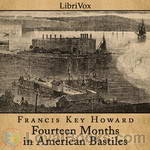 Fourteen Months in American Bastiles
Fourteen Months in American Bastiles
Francis Key Howard recounts in this book his life as a political prisoner of the United States. He points out that he was held captive at the same location where his grandfather was inspired to write the national anthem about the "land of the free," which makes a very stunning contrast. The sufferings that were imposed on him by the Union forces had the effect of solidifying his determination to resist unjust governmental dictates. (Introduction by Katie Riley) | |
By: Francis Parkman | |
|---|---|
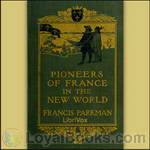 Pioneers of France in the New World
Pioneers of France in the New World
Francis Parkman (1823-1893) has been hailed as one of America’s first great historians and as a master of narrative history. Numerous translations have spread the books around the world. The American writer and literary critic Edmund Wilson (1895-1972) in his book O Canada (1965), described Parkman’s France and England in North America in these terms: The clarity, the momentum and the color of the first volumes of Parkman’s narrative are among the most brilliant achievements of the writing of history as an art... | |
 The Jesuits in North America in the 17th Century
The Jesuits in North America in the 17th Century
Parkman has been hailed as one of America's first great historians and as a master of narrative history. Numerous translations have spread the books around the world. The American writer and literary critic Edmund Wilson (1895-1972) in his book "O Canada" (1965), described Parkman’s France and England in North America in these terms: "The clarity, the momentum and the color of the first volumes of Parkman’s narrative are among the most brilliant achievements of the writing of history as an art... | |
By: Francis Pharcellus Church (1839-1906) | |
|---|---|
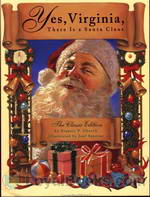 Yes, Virginia, There Is A Santa Claus
Yes, Virginia, There Is A Santa Claus
“Is There A Santa Claus?” was the headline that appeared over an editorial in the September 21, 1897 edition of the New York Sun. The editorial, which included the response of “Yes, Virginia, There is a Santa Claus,” has become an indelible part of popular Christmas lore in the United States. | |
By: Francis Rolt-Wheeler | |
|---|---|
 The Boy With the U.S. Census
The Boy With the U.S. Census
THE BOY WITH THE U.S. CENSUSBY FRANCIS ROLT-WHEELERPREFACELife in America to-day is adventurous and thrilling to the core. Border warfare of the most primitive type still is waged in mountain fastnesses, the darkest pages in the annals of crime now are being written, piracy has but changed its scene of operations from the sea to the land, smugglers ply a busy trade, and from their factory prisons a hundred thousand children cry aloud for rescue. The flame of Crusade sweeps over the land and the call for volunteers is abroad... | |
 Science - History of the Universe Vol. 7: Anthropology & Medicine
Science - History of the Universe Vol. 7: Anthropology & Medicine
Multi-volume work on science edited by Francis Rolt-Wheeler. The seventh volume is on Anthropology written by the editor himself and on Medicine written by Theodore H. Allen. An introduction to the Anthropology section was written by Frederick Starr. The section on Anthropology discusses its role in science, explains different human races, delved into prehistoric archaeology and further into the development of culture. The section on Medicine goes through medical knowledge from the ancients, Greeks, Romans, Arabians and all the way to the 17th to 19th century. It examined how these different eras affected the progress of medicine. - Summary by Sienna | |
 Science - History of the Universe Vol. 8: Mathematics
Science - History of the Universe Vol. 8: Mathematics
Multi-volume work on science edited by Francis Rolt-Wheeler. The eighth volume is on Pure Mathematics written by L. Leland Locke and on Mathematical Applications written by Dr. Franz Bellinger. An introduction was written by Professor Cassius J. Keyser with a special section on the Foundation of Mathematics. The Pure Mathematics section discusses numbers - its conception and calculations, as well as different areas of mathematics - algebra, geometry, trigonometry. The last section goes into the different applications of mathematics. - Summary by Sienna | |
By: Francis Wellman (1854-1942) | |
|---|---|
 Art of Cross-Examination
Art of Cross-Examination
A classic text on cross-examination of witnesses, including many examples of techniques used in celebrated cases by such notable attorneys as Abraham Lincoln and future Supreme Court Justice Benjamin Cardozo. Wellman sprinkles the text liberally with background facts and explanations of the cases and just plain gossip about the participants. Useful listening for anyone who occasionally feels the need to dig a bit deeper for the truth in any conversation. - Summary by Joanne Turner | |
By: Francis Whiting Halsey (1851-1919) | |
|---|---|
 Great Epochs in American History, Volume III
Great Epochs in American History, Volume III
This is the third volume in ten volume series of great epochs in the history of the United States, from the landing of Columbus to the building of the Panama Canal. In large part, events composing each epoch are described by men who participated in them, or were personal eye-witnesses of them. Volume III describes the French war and the Revolution and covers time period from 1745 to 1782. - Summary by Kikisaulite | |
By: François Fénelon (1651-1715) | |
|---|---|
 Lives of the Ancient Philosophers
Lives of the Ancient Philosophers
François Fénelon became a priest in 1675, Archbishop of Paris in 1679, was spiritual advisor to Madame Guyon, and was appointed tutor to Louis, Duke of Burgundy by Louis XIV in 1689. He wrote Dialogues of the Dead, and The Lives of the Ancient Philosophers as well as The Adventures of Telemachus expressly for his instruction. Fenelon wrote against the Jansenists and in favor of the Jesuits. He is also known for his Christian Perfection: Devotional Reflections on the Christian Life and Treatise on the Education of Girls.. - Summary by Wikipedia | |
By: François Norbert Blanchet (1795-1883) | |
|---|---|
 Historical Sketches of the Catholic Church in Oregon, During the Past Forty Years
Historical Sketches of the Catholic Church in Oregon, During the Past Forty Years
This book is a first-hand account of the experiences of Fr. Norbert Blanchet and his fellow missionaries to Oregon in the 1830’s and 1840’s. The original duo, Fr. Blanchet and Fr. Demers, had incredible adventures traveling across Canada by canoe, horseback, and river raft to arrive at the Hudson’s Bay Company Fort at Vancouver, Washington. From there, they energetically and joyfully established churches in the Willamette valley, along the Columbia River, and into present day Washington state and British Columbia... | |
By: François-René de Chateaubriand (1768-1848) | |
|---|---|
 Memoirs of Chateaubriand Volume IV
Memoirs of Chateaubriand Volume IV
After the extinction of Napoleon's comet on St Helena, Chateaubriand covers the Bourbon Restoration in this volume, meeting a dazzling array of literary and political figures, as his diplomatic career advances. - Summary by Nicole Lee | |
By: Frank Albert Waugh (1869-1943) | |
|---|---|
 Dwarf Fruit Trees
Dwarf Fruit Trees
This book is a handbook for the home orchardist. The propagation, pruning, choice of variety, and management of dwarf fruit trees, specifically apples, pears, peaches, and plums, are outlined. In addition, there is a section on berry bushes. It is geared towards gardeners in the United States of America and Canada. - Summary by A. Gramour | |
By: Frank Allaben (1867-1927) | |
|---|---|
 Concerning Genealogies
Concerning Genealogies
Written over a century ago, this comprehensive book offers insight into the methods used to research and compile a family history. As stated in the preface of the book, "Strong emphasis is laid upon the importance of employing the historical method..." which is sorely lacking in today's computerized compilations. - Summary by Roger Melin | |
By: Frank Evers Beddard (1858-1925) | |
|---|---|
 Book of Whales
Book of Whales
A Book of Whales is a natural history of whales for the layman. - Summary by A. Gramour | |
By: Frank G. Carpenter (1855-1924) | |
|---|---|
 Carpenter's Geographical Reader: North America
Carpenter's Geographical Reader: North America
The purpose of this book is to give to its readers a living knowledge of some of the wonders of the country and continent in which they live. Upon a personally conducted tour they are taken by the author through the most characteristic parts of the North American continent. They travel through the United States, British America, Mexico, and Central America, studying the most interesting features of life and work among the people of each country, learning how they are governed, and what they do in order to live. Much information is also given concerning the natural resources and the physical features of the countries visited. | |
 Carpenter's Geographical Reader: South America
Carpenter's Geographical Reader: South America
In this book the children are taken by the author upon a personally conducted tour through the most characteristic parts of the South American continent. The book will, it is believed, aid in putting flesh and blood on the bones of the geographies, and will give a living interest to geographical study. | |
 Carpenter's Geographical Reader: Europe
Carpenter's Geographical Reader: Europe
The book tries to give its young readers a living knowledge of Europe. The author conducts tours through various parts of Europe giving a glimpse of the people and their lives and livelihoods. He includes as well information on the natural resources and physical geography of those many countries. Summary by BettyB and preface. | |
 Around the World with the Children
Around the World with the Children
An introduction to world geography for young and old alike. Topics such as China, Japan, the American Indian, Europe and the oceans on a beginning level. Summary by BettyB | |
 Carpenter's World Travels: Australia, New Zealand and Some Other Islands of the South Seas
Carpenter's World Travels: Australia, New Zealand and Some Other Islands of the South Seas
Travel stories of the land "Down Under" from 100 years ago. Native life and scenery and commerce of islands such as Tonga and Fiji as well as the bustling city of Sydney. Summary by BettyB | |
 Alps, the Danube and the Near East
Alps, the Danube and the Near East
Journeying through many countries including Romania, Bulgaria, Turkey, Switzerland and Greece, the author gives an in-depth account of many aspects of the culture of the times and the people of the regions. | |
By: Frank Harris | |
|---|---|
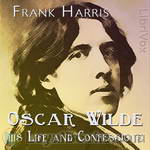 Oscar Wilde: His Life and Confessions
Oscar Wilde: His Life and Confessions
Consumers of biography are familiar with the division between memoirs of the living or recently dead written by those who “knew” the subject more or less intimately, and the more objective or scholarly accounts produced by later generations.In the case of Wilde, as presented to us by Frank Harris, we are in a way doubly estranged from the subject. We meet with Oscar the charismatic talker, whose tone of voice can never be reproduced – even if a more scrupulous biographer had set down his words accurately – and we are perhaps already aware of him as Wilde the self-destructive celebrity who uneasily fills the place of the premier gay icon and martyr in our contemporary view... | |
By: Frank Henderson | |
|---|---|
 Six Years in the Prisons of England
Six Years in the Prisons of England
A Merchant talks about daily life inside prisons of England, describes routines and how prisoners are treated. He notes stories of how fellow prisoners came to be in prison, and his ideas about the penal system, its downfalls and ways to improve it. The reader can see similarities to the problems we still have in regarding "criminals" today. (Introduction by Elaine Webb) | |
By: Frank Lewis Dyer and Thomas Commerford Martin | |
|---|---|
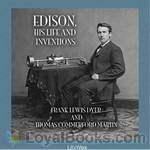 Edison, His Life and Inventions
Edison, His Life and Inventions
One of the most prolific and multi-talented geniuses the world has ever seen, Thomas Alva Edison's life is indeed an inspiration for each new generation. Today we live in a world that would not have been possible if not for several of his important inventions – the electric light bulb, the motion picture camera, electric power distribution, the phonograph, and a host of other things that we take for granted today. In fact, he still holds the world record for the maximum number of patents, numbering 1093 in all! Edison – His Life and Inventions by Frank Lewis Dyer and Thomas Commerford Martin, published in 1910 was in fact a biography commissioned by Edison himself... | |
By: Frank Webb (1828-1894) | |
|---|---|
 Garies and their Friends
Garies and their Friends
The book which now appears before the public may be of interest in relation to a question which the late agitation of the subject of slavery has raised in many thoughtful minds, viz. — Are the race at present held as slaves capable of freedom, self-government, and progress. The author is a coloured young man, born and reared in the city of Philadelphia. This city, standing as it does on the frontier between free and slave territory, has accumulated naturally a large population of the mixed and African race... | |
By: Frederic Bastiat | |
|---|---|
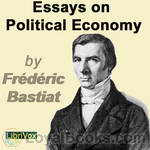 Essays on Political Economy
Essays on Political Economy
Bastiat asserted that the only purpose of government is to defend the right of an individual to life, liberty, and property. From this definition, Bastiat concluded that the law cannot defend life, liberty and property if it promotes socialist policies inherently opposed to these very things. In this way, he says, the law is perverted and turned against the thing it is supposed to defend. | |
By: Frédéric Bastiat | |
|---|---|
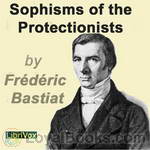 Sophisms of the Protectionists
Sophisms of the Protectionists
"To rob the public, it is necessary to deceive them," Bastiat said and believed. He reasoned, employing repetition to various applications, against fallacious arguments promoting the "Protection" of industries to the detriment of consumers and society. (Introduction by Katie Riley) | |
 Law
Law
"The law perverted! The law—and, in its wake, all the collective forces of the nation. The law, I say, not only diverted from its proper direction, but made to pursue one entirely contrary! The law becomes the tool of every kind of avarice, instead of being its check! The law guilty of that very inequity which it was its mission to punish! Truly, this is a serious fact, if it exists, and one to which I feel bound to call the attention of my fellow-citizens." —Frédéric Bastiat | |
By: Frederic Taber Cooper (1864-1937) | |
|---|---|
 Some American Storytellers
Some American Storytellers
Frederic Taber Cooper, who was an editor and author, provides a superb insight into the works of some of the most popular authors of the turn of the century decade. Excerpt: The subjects of the essays included in this volume differ widely in aim and in accomplishment; but all of them possess, to a considerable extent, the gift that makes them next of kin to the minstrel and troubadour, to the ancient fabulist, and to the forgotten spinner of the world s first nursery tales, the gift of holding the attention by the spell of the spoken word. - Summary by Celine Major | |
By: Frederick A. Talbot (1880-?) | |
|---|---|
 Aeroplanes and Dirigibles of War
Aeroplanes and Dirigibles of War
"Aeroplanes and Dirigibles of War" is an interesting read of the beginnings of air warfare in World War I. Anyone interested in early aviation and armament will find this a fascinating work. By William Tomcho. | |
By: Frederick Adam Wright (1869-1946) | |
|---|---|
 Greek Athletics
Greek Athletics
The history of Greek athletics as it pertains to the Olympics. Describes various activities such as boxing, wrestling, etc. and accounts from witnesses, the Iliad, etc. as they pertain to famous Greeks and events. He discusses Greek views of physical appearance and fitness as they pertain to the games and society and also how and why individual city-states chose to participate in the Olympics. | |
By: Frederick Boyle (1841-?) | |
|---|---|
 About Orchids, a Chat
About Orchids, a Chat
This is not a manual of instruction for orchid growers; though there are many hints on cultivation, and a few paragraphs on how to hybridize. The author is just an enthusiastic amateur orchid lover. He takes the reader on a wander through the dangers and consequences of hunting orchids in the tropical jungles of the nineteenth century, and chats about the extreme peculiarities of orchid growth, behaviour and structure, colouring the essays with his own experiences and with his delight in cultivating these beautiful plants. Beware! A new hobby beckons! | |
By: Frederick Czapek (1868-1921) | |
|---|---|
 Chemical Phenomena in Life
Chemical Phenomena in Life
Published in 1911 as part of the "Harper's Library of Living Thought," this volume presents an introduction to the chemistry of cells in the context of plant physiology and gives an interesting overview of the field of biochemistry and related sciences at the time. The author, Frederick Czapek, was a Czech botanist and professor of Plant Physiology at the University of Prague. He is perhaps best known for his two-volume work on Plant Physiology, "Biochemie der Pflanzen" and for Czapek solution agar or Czapek-Dox medium, a culture medium for cultivation of fungus species such as Aspergillus and Penicillium molds. ( | |
By: Frederick Douglass (1818-1895) | |
|---|---|
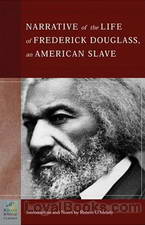 Narrative of the Life of Frederick Douglass
Narrative of the Life of Frederick Douglass
Frederick Douglass was born into slavery on a Maryland plantation. He faced hardship as a child, but later encountered owners who were relatively liberal and allowed him to learn to read, write and be in contact with freed slaves. At the age of 20, he escaped from the plantation and made his way to New York. Though he remained a fugitive, he married and changed his name to avoid being caught. He continued his education and became involved in the Abolitionist Movement. He began touring the country, speaking passionately about the unjust, cruel and inhuman practice of slavery... | |
By: Frederick G. Aflalo (1870-1918) | |
|---|---|
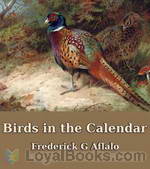 Birds in the Calendar
Birds in the Calendar
Delightful sketches of British wild birds – a bird for every month of the year from the pheasant in January to the robin in December. This collection of articles, reprinted in book form from the periodical The Outlook, is full of fascinating information about bird behaviour and habitat, as well as many interesting anecdotes. Out of date in some respects, particularly in its reference to the (now illegal) collecting of birds’ eggs, this book brings home forcefully how the populations of some British wild birds have declined since it was written. | |
By: Frederick J. Tabor Frost | |
|---|---|
 American Egypt
American Egypt
Arnold and Frost were English archaeologists who traveled to the Yucatan Peninsula and wrote "the first book ever written by Englishmen on Yucatan—that Egypt of the New World, where, it is now generally admitted, Central American Civilisation reached its apogee—and to be, for the present at least, the only Englishmen who can claim to have explored the uncivilised north-eastern portions of the Peninsula and the islands of her eastern coast." Their studies brought them to the conclusion, contrary to the bulk of the body of other contemporary experts, "that America's first architects were Buddhist immigrants from Java and Indo-China." | |
By: Frederick Treves (1853-1923) | |
|---|---|
 Elephant Man and other reminiscences
Elephant Man and other reminiscences
In 1884, Professor Treves saw Joseph Merrick in a shop across the road from the London Hospital. Being also a teacher at the University, he brought Merrick to the London Hospital as a teaching case, and Merrick lived there until his death in April 1890. This book of "reminiscences" includes the story of the "Elephant Man" as well as other interesting cases from Sir Treves' practice as a doctor. | |
By: Frederick Whymper (1838-1901) | |
|---|---|
 Sea: Its Stirring Story of Adventure, Peril, & Heroism. Volume 1
Sea: Its Stirring Story of Adventure, Peril, & Heroism. Volume 1
Everything about the sea: history of ships, famous mariners and life on shipboard, adventure, shipwrecks and daring rescues. - Summary by Kikisaulite | |
By: Frederick William Faber (1814-1863) | |
|---|---|
 Kindness
Kindness
Father Frederick William Faber was a beloved spiritual writer, preacher, and superior of the Oratory of St. Philip Neri in London. An Oxford scholar and Anglican priest since 1839, Faber converted to Roman Catholicism in 1845 following his mentor John Henry (later Cardinal) Newman. During the 1850s, Father Faber published several popular spiritual books, which have been treasured by Catholics ever since: All for Jesus, Growth in Holiness, The Blessed Sacrament, The Creator and the Creature, The Foot of the Cross, Spiritual Conferences, The Precious Blood, and Bethlehem... | |
By: Fridtjof Nansen (1861-1930) | |
|---|---|
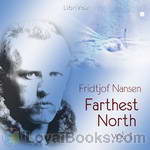 Farthest North
Farthest North
Being the Record of a Voyage of Exploration of the Ship "Fram", 1893-96 and of a Fifteen Months' Sleigh Journey by Dr. Nansen and Lieut. Johansen / by Fridtjof Nansen; with an Appendix by Otto Sverdrup | |
By: Friedrich Bente [translator] (d. 1930) | |
|---|---|
 Book of Concord Preface
Book of Concord Preface
The Christian Book of Concord was published in 1580 as a collection of eleven documents: Three Ecumenical Creeds and eight documents from the Reformation Era. Here is the Preface to the entire work together with the Saxon Visitation Articles from 1592. | |
By: Friedrich Engels (1820-1895) | |
|---|---|
 Socialism: Utopian and Scientific
Socialism: Utopian and Scientific
The main idea of "Socialism: Utopian and Scientific" (1880) was distinguishing scientific socialism and utopian socialism. Engels begins by chronicaling the thought of utopian socialists, starting with Saint-Simon. He then proceeds to Fourier and Robert Owen. In chapter two, he summarizes dialectics, and then chronicles the thought from the ancient Greeks to Hegel. Chapter three summarizes dialectics in relation to economic and social struggles, essentially echoing the words of Marx. | |
 Condition of the Working-Class in England in 1844
Condition of the Working-Class in England in 1844
This is Engels' first book (since considered a classic account of England's working class in the industrial age), which argues that workers paid a heavy price for the industrial revolution that swept the country. Engels wrote the piece while staying in Manchester from 1842 to 1844, based on th bohis observations and several contemporary reports conducted over the period. | |
By: Friedrich Kerst | |
|---|---|
 Mozart, The Man and the Artist as Revealed in His Own Words
Mozart, The Man and the Artist as Revealed in His Own Words
Wolfgang Amadeus Mozart. His name is one of the most recognizable names in history and one of the most enduring of composers. At age 5, this “wunderkinder” took to the stage and began his life as a prolific and celebrated creator-genius of such luminous works the world has not known since. This collection of morsels taken from his personal letters is engaging and gives a look into the mind of the boy wonder. Was he mad? Was he miraculous? | |
By: Friedrich Nietzsche (1844-1900) | |
|---|---|
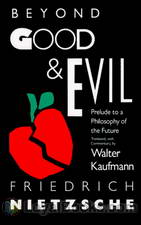 Beyond Good and Evil
Beyond Good and Evil
Beyond Good and Evil, by Friedrich Nietzsche A searing indictment of concepts like “truth” and “language” Beyond Good and Evil, by Friedrich Nietzsche is a deeply thought provoking book that forms one of the keystones of modern thought and politics. In this book, Nietzsche takes the position that our subservience to fixed perspectives that are forced on us by our language and our ideals make us incapable of perceiving reality. He propounds the theory that ideals are not fixed but change over time, often dramatically, and end up becoming the exact opposite of what they originally were... | |
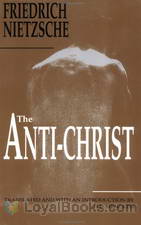 The Antichrist
The Antichrist
Save for his raucous, rhapsodical autobiography, Ecce Homo, The Antichrist is the last thing that Nietzsche ever wrote, and so it may be accepted as a statement of some of his most salient ideas in their final form. Of all Nietzsche’s books, The Antichrist comes nearest to conventionality in form. It presents a connected argument with very few interludes, and has a beginning, a middle and an end. | |
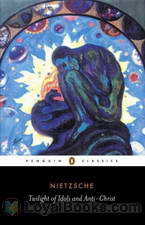 The Twilight of the Idols or How to Philosophise with the Hammer
The Twilight of the Idols or How to Philosophise with the Hammer
Of The Twilight of the Idols, Nietzsche says in Ecce Homo: “If anyone should desire to obtain a rapid sketch of how everything before my time was standing on its head, he should begin reading me in this book. That which is called ‘Idols’ on the title-page is simply the old truth that has been believed in hitherto. In plain English, The Twilight of the Idols means that the old truth is on its last legs.” Certain it is that, for a rapid survey of the whole of Nietzsche’s doctrine, no book, save perhaps the section entitled “Of Old and New Tables” in Thus Spake Zarathustra, could be of more real value than The Twilight of the Idols... | |
 Ecce Homo
Ecce Homo
The philosopher Friedrich Nietzsche’s autobiography, Ecce Homo, was the last prose work that he wrote before his illness in 1889. Coming at the end of an extraordinarily productive year in which he had produced The Twilight of the Idols and The Antichrist, Nietzsche shuns any pretense at modesty with chapter titles include “Why I am so Wise”, “Why I am so Clever” and “Why I Write Such Excellent Books”. His translator Anthony M. Ludovici states, Ecce Homo “is not only a coping-stone... | |
By: Friedrich Schiller | |
|---|---|
 The Thirty Years War
The Thirty Years War
The History of the Thirty Years War is a five volume work, which followed his very successful History of the Revolt of the Netherlands. Written for a wider audience than Revolt, it is a vivid history, colored by Schiller’s own interest in the question of human freedom and his rationalist optimism. Volume 1 covers the background of the war, through the Battle of Prague in late 1620. (Introduction by Alan Winterrowd) | |
By: Friedrich Wieck (1785-1873) | |
|---|---|
 Piano and Song
Piano and Song
This book talks about teaching, learning and performing on the piano in a delightful style, alternating between conversation and instruction. As he was the father of Clara Schumann and Robert Schumann's teacher, need I say more? | |
By: Friedrich Wilhelm Ludolf Gerhard Augustin, Baron von Steuben (1730-1794) | |
|---|---|
 Regulations for the order and discipline of the troops of the United States : part I
Regulations for the order and discipline of the troops of the United States : part I
More commonly know as "The Blue Book" written by "Baron von Steuben" this publication was key to organizing the young American military in the Revolutionary War with England. This book served both as a regulation and a how-to manual. Each officer was required to: purchase a copy upon being commissioned, carry it at all times, read it, and use it. | |
By: Fritz Kreisler | |
|---|---|
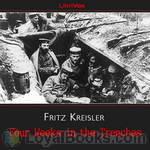 Four Weeks in the Trenches
Four Weeks in the Trenches
A brief record of the fighting on the Eastern front in the great war by a participant in that great and terrible conflict | |
By: Fyodor Dostoyevsky (1821-1881) | |
|---|---|
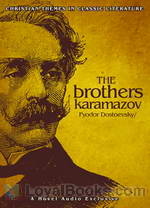 The Brothers Karamazov
The Brothers Karamazov
Set in 19th century Russia, The Brothers Karamazov (Russian: Братья Карамазовы) is the last novel written by the illustrious author Fyodor Dostoyevsky who died a few months before the book's publication. The deeply philosophical and passionate novel tells the story of Fyodor Karamazov, an immoral debauch whose sole aim in life is the acquisition of wealth. Twice married, he has three sons whose welfare and upbringing, he cares nothing about. At the beginning of the story, Dimitri Karamazov, the eldest son who is now a twenty-eight year old war veteran, returns to his home town to claim the inheritance left to him by his dead mother... | |
By: G. Campbell Morgan (1863-1945) | |
|---|---|
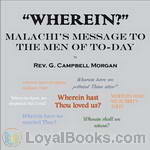 Wherein?
Wherein?
These studies in the book of Malachi were delivered as addresses to the students at Mr. Moody’s Bible School in Chicago, and then to my own congregation. They have also appeared in “The Record of Christian Work” in the United States, and in “Out and Out” in England. They are now sent out in a more permanent form, after careful revision, with the prayer that they may be used of God in calling His own children into the place of power without which form is nothing. (Introduction by G. Campbell Morgan) | |
 First Century Message to Twentieth Century Christians
First Century Message to Twentieth Century Christians
G. Campbell Morgan was one of the leading evangelical preachers of his day. He began preaching at age 13 and by age 26 was teaching at the Moody Bible Institute in Chicago, Illinois. He returned to England in 1904 to become pastor at Westminster Chapel in London. He was a contemporary and friend Martyn Lloyd-Jones, F. B. Meyer and Charles Spurgeon. In this book, Morgan examines the letters to the seven churches of Asia which begin the book of Revelation in the New Testament. Over 1900 years have passed, and yet our churches today face many of the same temptations, struggles and challenges as those faced by these first century believers... | |
By: G. K. Chesterton | |
|---|---|
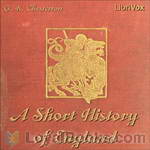 A Short History of England
A Short History of England
Gilbert Keith Chesterton was a prolific writer on many topics. His views of history were always from the standpoint of men and their interactions, and it may fairly be said he saw all of history as a battle between civilization and barbarism. So it has always been, and that remains true even today.“But it is especially in the matter of the Middle Ages that the popular histories trample upon the popular traditions. In this respect there is an almost comic contrast between the general information... | |
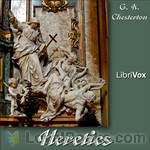 Heretics
Heretics
The Author Gilbert Keith Chesterton was born in London, England on the 29th of May, 1874. Though he considered himself a mere “rollicking journalist,” he was actually a prolific and gifted writer in virtually every area of literature. A man of strong opinions and enormously talented at defending them, his exuberant personality nevertheless allowed him to maintain warm friendships with people–such as George Bernard Shaw and H. G. Wells–with whom he vehemently disagreed. Chesterton had no difficulty standing up for what he believed... | |
 Orthodoxy
Orthodoxy
Orthodoxy is a book that has become a classic of Christian apologetics. In the book's preface Chesterton states the purpose is to "attempt an explanation, not of whether the Christian faith can be believed, but of how he personally has come to believe it." In it, Chesterton presents an original view of the Christian religion. He sees it as the answer to natural human needs, the "answer to a riddle" in his own words, and not simply as an arbitrary truth received from somewhere outside the boundaries of human experience. | |
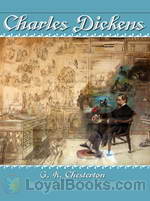 Charles Dickens
Charles Dickens
G. K. Chesterton was a great admirer of Charles Dickens, and wrote a noted critique of Dickens’ works expressing his opinion in his own inimitable style. | |
 Eugenics and Other Evils
Eugenics and Other Evils
Most Eugenists are Euphemists. I mean merely that short words startle them, while long words soothe them. And they are utterly incapable of translating the one into the other, however obviously they mean the same thing. Say to them “The persuasive and even coercive powers of the citizen should enable him to make sure that the burden of longevity in the previous generation does not become disproportionate and intolerable, especially to the females”; say this to them and they will sway slightly to and fro like babies sent to sleep in cradles. Say to them “Murder your mother,” and they sit up quite suddenly. Yet the two sentences, in cold logic, are exactly the same.” | |
 Miscellaneous Essays
Miscellaneous Essays
These nine files are miscellaneous short essays or stories from G. K. Chesterton. They were chosen for not only their brevity but also for being shining exemplars of Chesterton’s wit and whimsy. A fun but powerful introduction into the mind of the man that is G. K. Chesterton. | |
 Alarms and Discursions
Alarms and Discursions
Gilbert Keith Chesterton was an influential English writer of the early 20th century. His prolific and diverse output included journalism, philosophy, poetry, biography, Christian apologetics, fantasy, and detective fiction. Chesterton has been called the “prince of paradox.” He wrote in an off-hand, whimsical prose studded with startling formulations. Chesterton wrote about 4000 essays on various subjects, and “Ararms and Discursions is one of his collections. | |
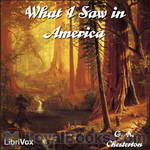 What I Saw in America
What I Saw in America
“Let me begin my American impressions with two impressions I had before I went to America. One was an incident and the other an idea; and when taken together they illustrate the attitude I mean. The first principle is that nobody should be ashamed of thinking a thing funny because it is foreign; the second is that he should be ashamed of thinking it wrong because it is funny.” (Gilbert Keith Chesterton) | |
 The New Jerusalem
The New Jerusalem
“On the road to Cairo one may see twenty groups exactly like that of the Holy Family in the pictures of the Flight into Egypt; with only one difference. The man is riding on the ass.” “The real mistake of the Muslims is something much more modern in its application than any particular passing persecution of Christians as such. It lay in the very fact that they did think they had a simpler and saner sort of Christianity, as do many modern Christians. They thought it could be made universal merely by being made uninteresting... | |
 The Crimes of England
The Crimes of England
“Second, when telling such lies as may seem necessary to your international standing, do not tell the lies to the people who know the truth. Do not tell the Eskimos that snow is bright green; nor tell the negroes in Africa that the sun never shines in that Dark Continent. Rather tell the Eskimos that the sun never shines in Africa; and then, turning to the tropical Africans, see if they will believe that snow is green. Similarly, the course indicated for you is to slander the Russians to the English and the English to the Russians; and there are hundreds of good old reliable slanders which can still be used against both of them... | |
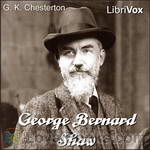 George Bernard Shaw
George Bernard Shaw
Chesterton and Shaw were famous friends and enjoyed their arguments and discussions. Although rarely in agreement, they both maintained good-will towards and respect for each other. However, in his writing, Chesterton expressed himself very plainly on where they differed and why. In Heretics he writes of Shaw: “After belabouring a great many people for a great many years for being unprogressive, Mr. Shaw has discovered, with characteristic sense, that it is very doubtful whether any existing human being with two legs can be progressive at all... | |
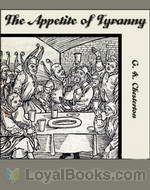 The Appetite of Tyranny
The Appetite of Tyranny
“Unless we are all mad, there is at the back of the most bewildering business a story: and if we are all mad, there is no such thing as madness. If I set a house on fire, it is quite true that I may illuminate many other people’s weaknesses as well as my own. It may be that the master of the house was burned because he was drunk; it may be that the mistress of the house was burned because she was stingy, and perished arguing about the expense of the fire-escape. It is, nevertheless, broadly true that they both were burned because I set fire to their house. That is the story of the thing. The mere facts of the story about the present European conflagration are quite as easy to tell.” | |
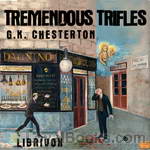 Tremendous Trifles
Tremendous Trifles
“None of us think enough of these things on which the eye rests. But don’t let us let the eye rest. Why should the eye be so lazy? Let us exercise the eye until it learns to see startling facts that run across the landscape as plain as a painted fence. Let us be ocular athletes. Let us learn to write essays on a stray cat or a coloured cloud. I have attempted some such thing in what follows; but anyone else may do it better, if anyone else will only try. ” (Gilbert Keith Chesterton) | |
 Varied Types
Varied Types
Another delightful and sharply pointed excursion into the topics of the day, and of our day as well, with Gilbert Keith Chesterton. Here he uses his wit and mastery of paradox to bring into focus a number of historical persons who in many ways typify the people who presently shape our world and who in their own right have already shaped Western civilization. These reprinted magazine articles are filled with his good natured wit and devastating ability to use reductio ad absurdum to destroy the popular myths that drive our society at full-speed into, and expose the utter nonsense that underlies, secular humanism. You will come away with yet another new collection of wonderful quotes. | |
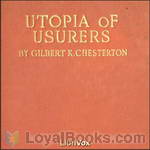 A Utopia of Usurers
A Utopia of Usurers
“Now I have said again and again (and I shall continue to say again and again on all the most inappropriate occasions) that we must hit Capitalism, and hit it hard, for the plain and definite reason that it is growing stronger. Most of the excuses which serve the capitalists as masks are, of course, the excuses of hypocrites. They lie when they claim philanthropy; they no more feel any particular love of men than Albu felt an affection for Chinamen. They lie when they say they have reached their position through their own organising ability... | |
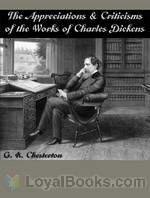 The Appreciations and Criticisms of the Works of Charles Dickens
The Appreciations and Criticisms of the Works of Charles Dickens
“These papers were originally published as prefaces to the separate books of Dickens in one of the most extensive of those cheap libraries of the classics which are one of the real improvements of recent times. Thus they were harmless, being diluted by, or rather drowned in Dickens. My scrap of theory was a mere dry biscuit to be taken with the grand tawny port of great English comedy; and by most people it was not taken at all–like the biscuit. Nevertheless the essays were not in intention so aimless as they appear in fact... | |
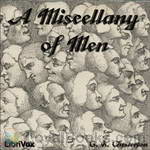 A Miscellany of Men
A Miscellany of Men
Gilbert Keith Chesterton was among the world’s most prolific writers who incorporated relentless logic, wonderful humor, and a clear view of truth into an amazing tool for exposing the foolishness of the policies of the world around him through the device of paradox.It is always great fun, and certainly always a learning experience to read Chesterton. A Miscellany of Men may be his hardest work to define, as it deals with a huge array of issues, using “personal types” as illustration. It would... | |
 Irish Impressions
Irish Impressions
“For the Irish Question has never been discussed in England. Men have discussed Home Rule; but those who advocated it most warmly, and as I think wisely, did not even know what the Irish meant by Home. Men have talked about Unionism; but they have never even dared to propose Union. A Unionist ought to mean a man who is not even conscious of the boundary of the two countries; who can walk across the frontier of fairyland, and not even notice the walking haystack. As a fact, the Unionist always shoots at the haystack; though he never hits it... | |
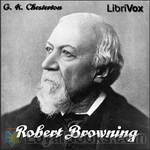 Robert Browning
Robert Browning
There is an old anecdote, probably apocryphal, which describes how a feminine admirer wrote to Browning asking him for the meaning of one of his darker poems, and received the following reply: “When that poem was written, two people knew what it meant–God and Robert Browning. And now God only knows what it means. | |
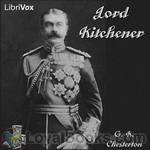 Lord Kitchener
Lord Kitchener
“The paradox of all this part of his life lies in this–that, destined as he was to be the greatest enemy of Mahomedanism, he was quite exceptionally a friend of Mahomedans.” | |